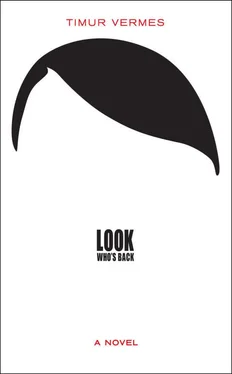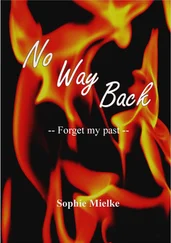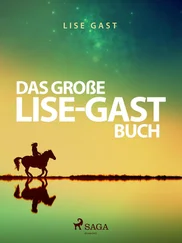“Like you, for example?”
“Amongst many others, yes.”
We had arrived at the map table. With flags I had marked the places where the “Bundeswehr” was currently deployed.
“May I ask how the Greens would bring the operation in Afghanistan to a victorious conclusion?”
“What do you mean, ‘victorious conclusion’? The military operation there must be brought to a speedy conclusion. It’s only leading to more violence…”
“I take the same view — there’s nothing for us to gain in Afghanistan. What is our objective there?”
“Hold on,” she said, “but—”
“Please don’t say you have fresh misgivings about my motives,” I said. “Please don’t tell me you’re allowed to withdraw from Afghanistan, whereas I have to stay there!”
“I’m not sure I’m going to say anything,” she said, her eyes darting around the studio. Her gaze came to rest below the map table.
“There’s a briefcase,” Künast said superciliously. “Is that meant to be there?”
“Someone must have forgotten it,” I said absently. “Where is Stauffenberg, by the way?”
The briefcase had been another idea of mine. In fact, the whole incident had come back to me in sharp detail when we visited the Wolf’s Lair. I suggested we could include it as a permanent feature in the programme. That and the visit to the map table. I thought we should hide the briefcase anew for each guest.
“Seeing as we’ve agreed on a withdrawal from Afghanistan,” I said, leaning over the table, “please tell us, to conclude: If the Greens took power in this country, which would be the first state they would annex?”
“The briefcase is ticking,” Künast said, dumbfounded.
That had been Sensenbrink’s idea. He had hit on it moments before I did.
“Don’t be daft,” I said. “Briefcases don’t tick. A briefcase is not an alarm clock. Which state, did you say?”
“Is confetti going to come out of it? Or flour? Or soot?”
“For goodness’ sake, why don’t you take a look?”
“That’s exactly what you want me to do, isn’t it? Come off it, I’m not stupid!”
“Then you will never find out,” I said. “We, on the other hand, have found out many interesting things about your most congenial party. Many thanks for having spent the evening with us — Frau Renate Künast!”
During the applause I glanced backstage, where Sensenbrink and Madame Bellini were standing. They clapped and then stuck out their fists with thumbs pointing upwards.
It felt wonderful.
The most important skill I have acquired during my career as a politician is the ability to judge one’s public obligations shrewdly. Essentially I have always despised the dependence on benefactors, and yet for the sake of his country the politician frequently has to compromise. It may be that public handshakes and deference to the cream of society is an attraction for that caste of political artistes who confuse life in the public sphere with a life for the public sphere, for the nation, for the small man who scrimps and saves to put bread on his table and clothe his children. And anybody who spends even a quarter of an hour watching the news on his television set will, with grim certainty, see at least half a dozen of those bootlickers, toadying up to some important person or other. Such behaviour has always repelled me, and I myself have only suffered various courtesy visits for the sake of the cause. Pure torture, but I undertook these for the sake of the party, for the German Volk, for the preservation of our race, or for a new Mercedes.
And for the four-hundred-square-metre apartment on Prinz regentenplatz.
And I suppose for the Obersalzberg too.
All these were acquisitions, however, which increased the appeal of the party and thus the movement, besides that of the Führer. When I think of the flood of visitors to the Obersalzberg, it astonishes me that anybody can maintain that it was a place where I could relax! And then there was Mussolini’s visit — ghastly! The point is, a Führer cannot withdraw from public life, or only intermittently. If his Reich capital is lying in ruins, then he may hole up for a while in his Führerbunker. Otherwise, the Führer belongs to his Volk. Which is why I was delighted to receive the invitation from Munich.
Back in late August a renowned society magazine had written me a letter, in which the editor requested that I pay her publication a visit during the Greater German Volksfest, which had reverted to its original name of “Oktoberfest”. Everybody at Flashlight encouraged me to accept the invitation; for my part I was hesitant at first. I had never been there during the first period of my life, but times had changed and with them the significance of this fortnight-long tradition. As several people reassured me, the Oktoberfest had now become a Volksfest which took place without involving a particularly large proportion of the population. Anybody wishing to sit and partake of food and drink in one of the tents had to reserve a place months, sometimes years in advance, or else reschedule their visit to a time of day when no decent German would ever dream of going there.
Well, no person sound of mind would plan an innocent affair such as a visit to a Volksfest months or years in advance. As a consequence, so I learned, the place teemed in the morning and early afternoon with indecent Germans as well as foreigners and tourists attracted by the aura of the famous festival. Already by lunchtime these people tried desperately to make an evening of the day. Both Madame Bellini and Sensenbrink warned me against making an appearance too early, as it implied that one was an insignificant, peripheral figure. The evenings were not for the local population either, but for businesses from every branch of industry imaginable. Practically any firm with half a name for itself felt obliged to arrange visits to the “Wiesn” for its clients or the press. Some organs of the press, however, dissatisfied with what was on offer or with the guests present, had taken it upon themselves to tailor a more congenial visit to the “Wiesn”. To my mind this was a terribly smart, indeed positively Goebbels-like course of action.
Some of these gatherings, I was assured, were now as important as the opera balls of old. And this magazine’s soirée was amongst the most important. My acceptance, moreover, turned out to be a particularly effective propaganda coup; in the past I had kept my distance from the festival, and now several tabloid newspapers were able to write on their front pages, “Führer’s First Fest”. The smooth relationship I now enjoyed with these papers, I reflected with no little satisfaction, meant that the need to establish a new Völkischer Beobachter was dropping down my list of priorities.
I had arrived in the city around noon and used the time to call in on some much-loved old haunts. I lingered for a while at the Feldherrnhalle, remembering the blood spilled by loyal comrades there; I wandered nostalgically past the Hofbräukeller; then, with some apprehension, I walked to Königsplatz. But how my heart beat for joy when I saw all the magnificent buildings still standing unscathed: the Propylaea, the Glyptothek, the State Collections of Antiquities! And — this I had scarcely dared to hope — not only were the Führerbau and the N.S.D.A.P. Administrative Building still standing, but they were in use, too! It had not escaped even those opinionated and cocksure democrats that Königsplatz was only complete with the addition of these highly refined constructions. Feeling gay, I continued my stroll through Schwabing; my feet took me as if of their own accord to Schellingstraße, and to an unhopedfor reunion. It would be hard to convey the sheer magnitude of my delight when I spied the sign for the Osteria Italiana, behind which hid none other than my old hangout, the Osteria Bavaria. I would have loved to have gone in and partaken of something small, a glass of mineral water perhaps, but time was marching on and I had to return to my hotel, from where an automobile was to fetch me that evening.
Читать дальше












